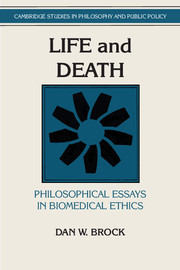Book contents
- Frontmatter
- Contents
- Sources and acknowledgments
- Introduction
- PART I PHYSICIANS AND PATIENTS MAKING TREATMENT DECISIONS
- 1 Informed consent
- 2 The ideal of shared decision making between physicians and patients
- 3 When competent patients make irrational choices
- PART II LIFE-AND-DEATH DECISIONS IN THE CLINIC
- PART III LIFE-AND-DEATH DECISIONS IN HEALTH POLICY
- Index
3 - When competent patients make irrational choices
Published online by Cambridge University Press: 05 June 2012
- Frontmatter
- Contents
- Sources and acknowledgments
- Introduction
- PART I PHYSICIANS AND PATIENTS MAKING TREATMENT DECISIONS
- 1 Informed consent
- 2 The ideal of shared decision making between physicians and patients
- 3 When competent patients make irrational choices
- PART II LIFE-AND-DEATH DECISIONS IN THE CLINIC
- PART III LIFE-AND-DEATH DECISIONS IN HEALTH POLICY
- Index
Summary
In recent years, physicians and patients have tended to move toward shared decision making. Although it sounds reasonable on the surface that patients and physicians should collaborate in making decisions about medical care, surprisingly little attention has been given to the complex and troubling issues that can arise. In particular, what does shared decision making imply for a physician's responsibilities when an apparently competent patient's choice appears to be irrational? A discussion of this issue requires a taxonomy of the different sources and forms of irrational decision making. We believe such a taxonomy should include the bias toward the present and near future, the belief that “it won't happen to me,” the fear of pain or the medical experience, patients' values or wants that make no sense, framing effects, and conflicts between individual and social rationality. Our main aim here is to develop this taxonomy and thus to bring out some of the theoretical and practical obstacles involved in distinguishing between a patient's irrational choices, which the physician may seek to change, and merely unusual choices that should be respected. To avoid any misunderstanding, we emphasize at the outset that even the irrational choices of a competent patient must be respected if the patient cannot be persuaded to change them.
- Type
- Chapter
- Information
- Life and DeathPhilosophical Essays in Biomedical Ethics, pp. 80 - 92Publisher: Cambridge University PressPrint publication year: 1993

